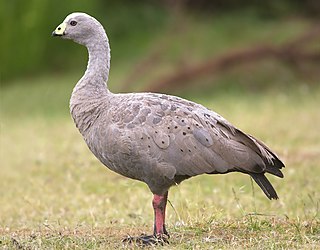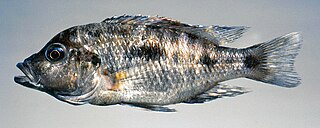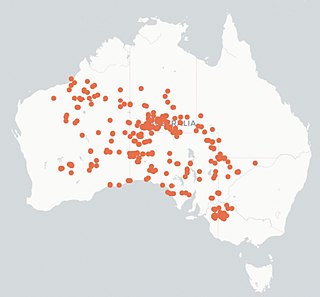
Swans are birds of the family Anatidae within the genus Cygnus. The swans' closest relatives include the geese and ducks. Swans are grouped with the closely related geese in the subfamily Anserinae where they form the tribe Cygnini. Sometimes, they are considered a distinct subfamily, Cygninae.

The black swan is a large waterbird, a species of swan which breeds mainly in the southeast and southwest regions of Australia. Within Australia, the black swan is nomadic, with erratic migration patterns dependent on climatic conditions. It is a large bird with black plumage and a red bill. It is a monogamous breeder, with both partners sharing incubation and cygnet-rearing duties.

The black-necked swan is a species of waterfowl in the tribe Cygnini of the subfamily Anserinae. It is found in Argentina, Brazil, Chile, Uruguay, and the Falkland Islands.

The northern saw-whet owl is a species of small owl in the family Strigidae. The species is native to North America. Saw-whet owls of the genus Aegolius are some of the smallest owl species in North America. They can be found in dense thickets, often at eye level, although they can also be found some 20 ft (6.1 m) up. Saw-whets are often in danger of being preyed upon by larger birds of prey. The northern saw-whet owl is a migratory bird without any strict pattern.

The coscoroba swan is a species of waterfowl in the subfamily Anserinae of the family Anatidae. It is found in Argentina, Bolivia, Brazil, Chile, Paraguay, Uruguay, and the Falkland Islands.

The Cape Barren goose is a large goose resident in southern Australia.
Dyacopterus is a genus of megabats from south-east Asia. It contains three species, namely:

Delany's mouse or Delany's swamp mouse is a species of rodent in the family Nesomyidae. It is the only species in the genus Delanymys and the only extant member of subfamily Delanymyinae, which also contains the fossil genus Stenodontomys. It was previously placed in subfamily Petromyscinae, but it is apparently not closely related to Petromyscus. It is found in Democratic Republic of the Congo, Rwanda, and Uganda. Its natural habitats are subtropical or tropical high-altitude shrubland and swamps. It is threatened by habitat loss.

Otopharynx brooksi is a species of cichlid endemic to Lake Malawi. This species can reach a length of 15 centimetres (5.9 in) TL. This species can also be found in the aquarium trade. The specific name of this fish honours John Langdon Brooks (1920-2000), an evolutionary biologist at Yale University.

Brooks's dyak fruit bat is a species of megabat in the family Pteropodidae endemic to Sumatra. It was formerly included as a subspecies of the dayak fruit bat. It is named for Cecil Joslin Brooks, who collected the type specimen near Bencoolen and presented it to Oldfield Thomas.

The mute swan is a species of swan and a member of the waterfowl family Anatidae. It is native to much of Eurosiberia, and the far north of Africa. It is an introduced species in North America, home to the largest populations outside of its native range, with additional smaller introductions in Australasia and southern Africa. The name "mute" derives from it being less vocal than other swan species. Measuring 125 to 160 cm in length, this large swan is wholly white in plumage with an orange beak bordered with black. It is recognizable by its pronounced knob atop the beak, which is larger in males.
Chrysoritis brooksi, the Brook's opal, is a butterfly of the family Lycaenidae found only in South Africa.

Cubophis is a genus of snakes in the family Colubridae. They are found in the northwestern Caribbean.
Harpesaurus brooksi is a species of lizard in the family Agamidae. The species is endemic to Sumatra.

Ctenotus brooksi, also known commonly as Brooks' wedge-snouted ctenotus, the wedgesnout ctenotus, and the sandhill ctenotus, is a species of skink, a lizard in the family Scincidae. The species is endemic to Australia and found in semi-arid regions.

Cubophis cantherigerus, the Cuban racer, is a species of snake in the family Colubridae. The species is native to Cuba and The Bahamas.

Cubophis caymanus, the Grand Cayman racer, is a species of snake in the family Colubridae. The species is native to Grand Cayman.
Cubophis fuscicauda, the Cayman Brac racer, is a species of snake in the family Colubridae. The species is native to Cayman Brac.
Cubophis ruttyi, the Little Cayman racer, is a species of snake in the family Colubridae. The species is native to Little Cayman Island.

Cubophis vudii, the Bahamian racer, is a species of snake in the family Colubridae. The species is native to The Bahamas.














